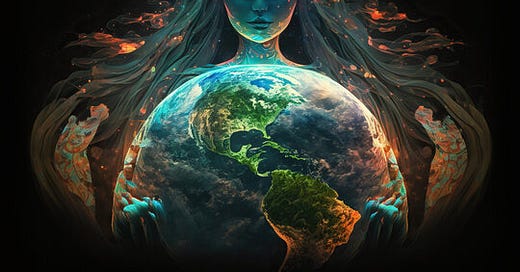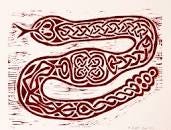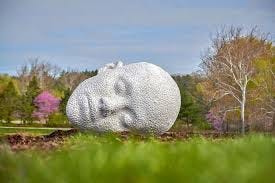“Our mother is dying. We must care for her.” When Dwayne Tomah, Passamaquoddy storyteller, stood in front of the floor-to-ceiling glass windows at Wolfe Neck Center, blackened by the early dark, and said these words a few weeks ago, it struck me that I had never heard a man call earth Mother. Mother Earth. Nor had I heard anyone speak about their relationship to Mother Earth in a way that brought her to life so fully.
Listening to Dwayne, reverberating with his energy, my hands softened, my body warmed. I felt a desire to lay my head on this Mother’s shoulder, to embrace and be embraced, to care for this wounded Mother and be cared for.
How had it taken me so long to experience this deep sense of connection and relationship to this Mother on whom I am completely dependent for every breath I take? This Mother who feeds me and warms me and dazzles me with beauty?
In all the years I’ve spent as a psychotherapist doing diagnostic assessments, never did I ask what that person’s relationship is to Mother Earth and all her feathered, furry, finned family. None of the theories about attachment, relationship, or self that underlie my work led me to consider that one’s well-being was in any way dependent on attachment to the very forces of life that keep us alive. Or that the care and well-being of those forces ought to be a guiding principle for how I formed my sense of self.
I toiled in the land of what John Rankin Wilson calls “the interior-spatial, skin-encapsulated isolated mind.” The theories assumed a narcissistic entitlement to air, water, clouds, sky and all its processes, all posited on the notion that this miracle of life systems would be there for us, or rather for ME, forever.
Until it wasn’t.
So here I am at the end, looking back, a bit horrified that it took the threat, not of my death, but of the death of so much life on Mother Earth for me to come out of my self-enclosed oblivion and experience myself as part of what Thich Nhat Hanh calls interbeing:
“If you are a poet, you will see clearly that there is a cloud floating in this sheet of paper. Without a cloud, there will be no rain; without rain, the trees cannot grow: and without trees, we cannot make paper. The cloud is essential for the paper to exist. If the cloud is not here, the sheet of paper cannot be here either. So we can say that the cloud and the paper inter-are.”
Even more horrifying for me is the fact that these ideas about relationship have existed for millennia and are not new to me. Over the years I’ve dabbled in Buddhist practice, read Tich Nhat Hanh, spent weekends at Kripalu. But my mind remained stitched into my skin, so separate and dissociated from my relationship to earth that I remained blind to the violence and harm caused by my life choices. And of course, Indigenous world views are posited on what is called Kinship, though truthfully, it is only in the last year that I awoke to this concept.
And here I begin to feel a river of sadness flow: my ancestors knew these truths. Less than 200 years ago there was a Sullivan or a Flanagan or a Gallagher who stood on a hill in the moonlight somewhere in County Cork and talked to the fairies and leprechauns and banshees who lived in shadows, who knew that trees and wells and stones were kin. Driven from their ancient homeland in what has been called a genocide, my ancestors left all that behind when they sailed for a dazzling future in America, clinging to the life raft of progress:
And progress they did: my great grandfather Francis Sullivan pouring a beer behind the bar he owned inside Grand Central Station, that cavernous cathedral of metal and glass and light and steam and men in suits and ties rushing off to make their fortunes in boardrooms overlooking a forest of concrete spires, the Hudson River but a flash of blue in the distance. My other great grandfather, Jeremiah Flanagan, overseeing the Brooklyn Navy yard during WW1 as menacing steel gunboats were manufactured like Lego toys. My grandfather, as a boy, waking to the hammering cacophony of ship construction and the smell of the fuels used to weld those ships.
All those Irish stories about snakes who speak and wells that house spirits, forgotten; all that grief, all that loss: all of it cut off, repressed.
What shard of story and past connection to the earth and her ancestors was my mother searching for when she scanned the grass and fields for four-leaf clovers, riveted in her search for these green life forms? When she had grandchildren, my mother taught them to search and even now her great grandchildren scan the scrubby patches beside our dirt road for these old Celtic symbols of good fortune. Was my mother searching for a reunion with the Mother her ancestors lost when they left their culture so intimately connected to earth and her children, those wily snakes?
America is very young, but old enough that most people today have little knowledge of what our ancestors’ lives were like in “the old country.” Dispossessed ourselves, we dispossessed others and felt entitled. The victims of genocide ourselves, we committed genocide when we came here. Do or be done to.
Holding that four-leaf clover in my hand, I hold centuries of grief and loss, of shame and guilt but I also hold the potential for a deep sense of connection, of kinship, to all that life beyond my “skin-encapsulated isolated mind.”
Peeling off those layers of skin that encapsulate my mind and learning how to see and feel and be moved by the experience of being in the embrace of a wounded Mother Earth will take time. I need to get better at what my profession calls attunement. Here’s Daniel Siegel on attunement:
“When we attune with others, we allow our own internal state to shift, to come to resonate with the inner world of another. This resonance is at the heart of the important sense of “feeling felt” that emerges in close relationships. Children need attunement to feel secure and to develop well, and throughout our lives we need attunement to feel close and connected.”
Reflecting on this now, I believe it is this absence of attunement to Mother Earth that is holding back our progress on climate action. By now most people have had some kind of personal experience with the climate crisis so that they are no longer in denial. Three years ago, when I was editing a book of art and writing on climate, half the images submitted were of polar bears. Not another god-damn polar bear I thought to myself as I read a new submission. Climate change had not yet come close enough to peoples’ lives for it to be real.
But in the last few years things have changed. “Now we are the polar bears”, said Dr. Nirav Shaw, now Principal Deputy Director of the CDC, a few nights ago when he spoke at a Freeport Speech presentation on public health and climate change.
Real though it is for many people, most of us don’t know what to do beyond recycling the plastic ketchup bottle and installing a heat pump, actions that are important but don’t dramatically reorder our relationship to the natural world, don’t feel its many deaths as ours, don’t alter our idea of self as entitled to all her bounty with no personal responsibility for her care.
When Dr. Shaw was asked what we could all do about the climate crisis he said the right things about paying attention to the fact that we are the polar bears now, but his imagination about what we could do was, I believe, limited by his own dissociation from the natural world. The mighty caring man whom we all respect and credit with our own well-being during Covid might as well have absolved everyone in the room of any personal responsibility to look long and hard at the paradigms that lock our minds and hearts and selves from being in attunement with the earth in a way that allows us to imagine and believe we can alter our lives so that earth can thrive.
We can do two things, he said definitively: we can electrify everything and put good managers and leaders in place. “We will never give up our cars or our air travel.” This good man who wakes up every hour thinking of another threat to our health and tossing and turning to imagine solutions to that threat, basically said it is the managers and the leaders who can affect this, not those of us in the room. He could not imagine charging us with the same responsibility to care as deeply for the earth as he cares about us, to wake in the middle of the night and imagine ways we can transform our lives so that acts we take consider not only our well-being but the well-being of all our ecosystems, of which we are a tiny part.
Someday perhaps Dr. Shaw will meet Dwayne Tomah and they will have a deep conversation and perhaps Dr. Shaw’s hands will soften and his body yearn to be embraced by our planetary mother.
Next week I hope to ground this essay in the idea of attunement and consider what an ordinary day spent in deep attunement with the earth would look like, how that might change me,








Kathleen quoted this in her essay:
. "If you are a poet, you will see clearly that there is a cloud floating in this sheet of paper. Without a cloud, there will be no rain; without rain, the trees cannot grow: and without trees, we cannot make paper. The cloud is essential for the paper to exist. If the cloud is not here, the sheet of paper cannot be here either. So we can say that the cloud and the paper inter-are.”
Compare to this Buddhist take from the Korean teacher, Jae Woong Kim (1940-)
"In order for a bowl of rice to get to your table, the heavens must have let the sun shine to grow the rice paddy and scattered just enough rain to wet the shoots. The earth must have opened its heart to let the rice spread its roots, and the wind must have blown cool breezes to ripen the crops. The whole process must be teeming with the sweat of the farmer who planted the rice in spring, pulled the weeds in summer, harvested the crops in fall, and with the care of the one who made the warm bowl of rice, soaking it and boiling it.
Not only that but, in order for today's farming and table to exist, there had to be vertical accumulation of technologies from numerous ancestors and traditions. Horizontally there were precious efforts to produce farming tools, fertilizers, threshers, a rice mill, kitchen utensils, fuel and so on. Therefore, how can you call a bowl of rice yours just because you bought it with your money?
Trace its history--in a bowl of rice, there is the grace of the entire human race and the whole universe."
We have this passage on the wall of our kitchen below a picture of H.H. Tenzin Gyatso, 14th in his line.
All next to the spice rack. Interbeing.
Kathleen, thank you for this meditation on attunement. The attitude toward self that you call out in so many of us brings to mind Milton Mayeroff's "On Caring", wherein he argues that the measure of caring is to help another to grow and to care for yet others. Mayeroff illustrated this idea with many examples, especially a father's relationship with his children, and extended "caring for" to ideas (democracy) and institutions. He did not use the example of our relationship to Mother Earth, however, but well he might have.
Your essay also calls to mind Nancy Fraser's assessment of capitalism, "Cannibal Capitalism", in which she argues that an essential component of capitalism is treat nature, Mother Earth, as a resource, freely available for use for the pursuit of profit, and with absolutely no thought of the need for its repair or replenishment. I do see the hand of capitalism in shaping our view of ourselves inward, isolating us from "interbeing", and making it so difficult to fully comprehend our very interconnectedness with all else, perhaps especially with Mother Earth. There is no more powerful socialization agent in the world as capitalism. Call it, as many do, "consumerism" or "materialism", but I fear that we are all poisoned and sickened by it. The encyclicals of Pope Francis do not mention capitalism, but that is clearly the source of what he sees in our inability to care for our common home. Is "integral ecology" not attunement?
'True' caring is difficult to do, even for those who otherwise present themselves as caring, like the example of Dr. Shaw. I find it challenging to even sense this alienation I have from Mother Earth (and to sense the limitations of my efforts to care for others), even as I consider myself a caring person and "climate activist". So thank you for a meditation that allowed me to see connections that I had missed in writings that matter to me. Cletis